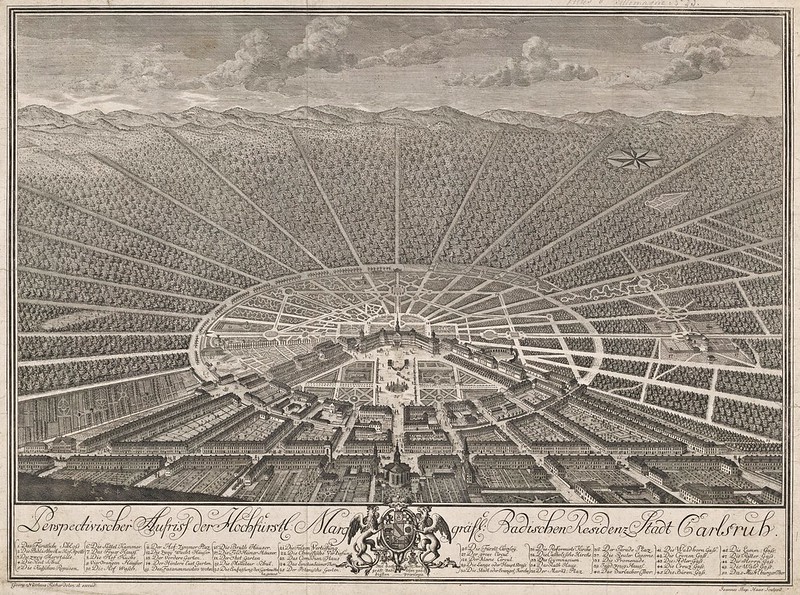Johann Melchior Molter (1696-1765) - Sinfonia F-Dur, No. 99 (c.1750) [MWV 7.14 / IJM 116]
Performers: Dresden PhiIharmonic Chamber Orchestra; Alеxandеr Pеtеr (conductor)
Engraving: Johann Baptist Haas (1732-1791), naar George Nicolaus Fischer - Gezicht op het paleis van Karlsruhe
Further info: Johann Melchior Molter (1696-1765) - Clarinet Concertos
---
German composer. Like many German musicians of the first half of the
18th century, he came from the Thuringian-Saxon area. His father,
Valentin Molter, was a teacher and Kantor in the village of Tiefenort,
and Johann Melchior probably received his earliest musical education
from him. Later he attended the Gymnasium in Eisenach, where J.S. Bach
had earlier been a pupil; he also belonged to the Chorus Symphoniacus
under the directorship of Kantor J.C. Geisthirt, which brought him into
contact with the music cultivated in Thuringia, especially that of the
Eisenach court orchestra founded in 1708 by Telemann. He apparently left
Eisenach in 1715; in autumn 1717, as a violinist, he entered the
service of the Margrave Carl Wilhelm of Baden-Durlach who had moved that
year from Durlach to the newly-founded and rapidly growing city of
Karlsruhe. There, in 1718, Molter married Maria Salome Rollwagen; they
had eight children. The young Hofmusicus rapidly won the margrave's
favour and he was sent to Italy with full salary to study the Italian
style. Molter spent 1719-21 in Venice and Rome, and may have come into
contact with such artists as Vivaldi, Albinoni, the Marcello brothers,
Tartini and Alessandro Scarlatti. In 1722, after his return to the Baden
residence, the margrave appointed him court Kapellmeister in succession
to Johann Philipp Käfer. This activity came to an abrupt end in 1733
when, at the outbreak of the War of the Polish Succession, the margrave
dissolved his Kapelle and fled to Basle in exile. Molter was dismissed
but retained his title. The next year, however, he obtained the post of
Kapellmeister at the court of Duke Wilhelm Heinrich of Saxe-Eisenach,
which had fallen vacant on the death of Johann Adam Birckenstock. His
duties in Eisenach were the same as those in Karlsruhe except that there
were no opera productions. The many works of these years include sacred
and secular vocal compositions.
Molter's wife died in 1737, and a second visit to Italy later that year
may be connected with this; artistically, the reason for the journey lay
in Molter's wish to acquaint himself with the new developments in
Italian music, associated with such composers as Pergolesi, Leo and
Sammartini. While in Italy, in 1738, Molter received news of the
Margrave Carl Wilhelm's death, and hurried to Karlsruhe where he
honoured his former patron with a performance of funeral music. He
returned to Eisenach, and at some time before 1742 he married Maria
Christina Wagner. In 1741 Duke Wilhelm Heinrich died without issue
(Molter supplied the funeral music) and Saxe-Eisenach passed to the Duke
of Saxe-Weimar, who dissolved the Eisenach Kapelle. Molter went to
Karlsruhe in 1742 and obtained employment there the next year, with the
additional obligation to teach music at the Gymnasium. Financial
conditions, however, were less good than before 1733, and the small
orchestra was appropriate only for modest undertakings. Molter overcame
this situation by composing many chamber works. No change occurred until
Carl Wilhelm's grandson and successor, Margrave Carl Friedrich
(1728-1811), reached his majority and assumed government. In 1747 he
commissioned Molter to develop a plan for the reorganization of the
court's musical establishment, with which he subsequently agreed in most
respects. Molter could now perform any kind of music, especially as
several musicians were not only virtuosos on their own instruments but
also played a second (among them the clarinet and viola da gamba). In
the following years Molter wrote a vast quantity of cantatas,
symphonies, concertos and chamber music. Works of other composers,
German, Italian and French, were also performed. Court music at
Karlsruhe flourished, though opera production was not resumed. Molter
occupied this post until his death, and it may have been as a tribute to
Molter that the margrave left his post vacant for a whole year despite
the existence of a suitable candidate.

Cap comentari:
Publica un comentari a l'entrada